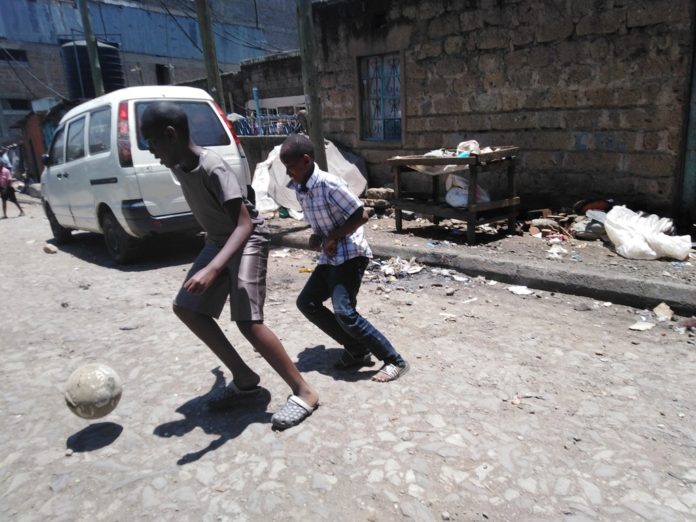Nairobi, March 23 — On a fine Monday morning, the streets of Mathare slums in the outskirts of Kenya’s capital, Nairobi are busy with residents engaging in the hustle and bustle of daily lives to at least put food on their tables. But the lack of food or money might not be in most of their minds at the moment. Kenya has recorded up to 16 cases of the novel coronavirus in the country.
Children are playing on the streets, unknowingly, as some help their parents sell on the street sides. Schools have closed and they have no other thing to do, unlike in most suburbs and other parts of the country where their parents would have television sets, smartphones, computers or tablets for them to access online lessons as promised and directed by the government.
Esther Anyango, a 41-year-old mother of seven and a resident of Mathare’s Area 4 is operating an open-air kiosk in the streets selling silver cyprinid fish, and says that she will only heed the advice to stay home when there is no option left. “If I stayed home today, tomorrow I would be begging in the streets for food together with my husband and children. So, unless the government is supplying us with food, staying home only spells another death sentence for us,” Anyango says.

Her daughter gradually slides away as I approached her stand and Anyango later tells me that she had thought I was a government official who was here to enforce the government’s directive to stay home and have children learning indoors.
On March 13th, Kenya reported its first case of the virus. President Uhuru Kenyatta then ordered the closure of all learning institutions in the country, with the latest closing on Friday 20th. The Ministry of education then announced that students will continue their learning online and on TV, as they await the next directive by the government. This was even after the President also said that everyone should work from home except those in essential services.
Today, the Kenyan Cabinet Secretary Health, Mutahi Kagwe announced that nine more cases had been confirmed to be COVID-19 positive, bringing the number to 25, up from 16 as of yesterday. This has been followed by stricter measures by the government banning gatherings in churches, weddings, bars, and public transportation; and advising Kenyans to remain and work from home, wash their hands regularly, and exercise social distancing.

But as for the case of Anyango and many other families living in informal settlements, they are faced with difficult times ahead that are threatening to wipe them out should the virus enter their residential areas.
Asked whether her children have been studying at home since the government ordered the closure of schools, Anyango smiles and says, “It doesn’t make sense. They had promised the children laptops, they didn’t bring them. Maybe those would be the ones they would be using to learn from right now. We don’t have TVs here and cannot access the internet. I don’t have a smartphone, their father does, but how many children can learn at once on such a small gadget given also that they are in different grades, others even in high school?” Anyango wonders.
Cecilia Ayot, the Member of County Assembly for Laini Saba ward in Nairobi’s Kibera slums, the largest informal settlement in Africa says that the pandemic can only spell doom if it hits their area.

“As slum dwellers, we already have challenges in our lives trying to cope with the harsh conditions in our areas of residence eve before we have a pandemic like the coronavirus. So basically, it means that it will really push us because most of our people are those who work in the informal sector, trying to make ends meet and depending on a daily wage,” she says.
Ayot adds that women will be worst hit because most of them normally depend on doing house chores for people in other suburbs and with the government directives to have people work from home, this will be a huge loss for them
“In most cases, you will find women from the slums going to other estates to do cleaning so they can be able to cater for their families. Now that people are working from home and want to exercise social distancing, it basically means that these women do not have jobs. What has happened in the past few days is that the younger women have turned to prostitution because that is the only way they can get quick money,” Ayot explains.
And as for the children in these settlements, it is uncertain what will happen to them as their counterparts in areas where they can access television sets and other tech-savvy gadgets to access the education ministry’s curriculum courses.

Diana Mukami, a teacher in one of the schools in Mukuru Kwa Njenga slums also points out that teachers are not well equipped to lead these studies. “I cannot use a computer myself, what was taught in college was not adequate and we were never given the resources for practice. So, if the government expects me to deliver courses for children online, then it means that our children are not going to learn,” she says.
Most children in the Kenyan slums also depend on schools for meals, especially those in schools where the United Nation’s World Food Program distributed food for the provision of free lunch to the pupils.
“You always find that these children depend fully on these meals and their parents cannot afford any other meal for them. The closure of schools means first a burden for the children in terms of hunger as well as the parents in trying to provide for them even when work is suspended; all before we start talking of the pandemic. We only pray to god that this pandemic does not strike the slums and that a miracle will happen,” Ayot concludes.

